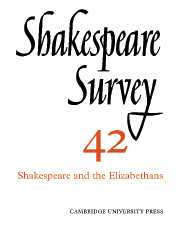Book contents
- Frontmatter
- ‘Jack hath not Jill’: Failed Courtship in Lyly and Shakespeare
- Truth and Art in History Plays
- Chronicles and Mythmaking in Shakespeare’s Joan of Arc
- King John and Embarrassing Women
- Golding’s Ovid, Shakespeare’s ‘Small Latin’, and the Real Object of Mockery in ‘Pyramus and Thisbe’
- Ovid and the Sonnets; or, did Shakespeare Feel the Anxiety of Influence?
- The Play of Sir Thomas More and Some Contemporary Events
- ‘Nobody’s Perfect’: Actors’ Memories and Shakespeare’s Plays of the 1590s
- The Boyhood of Shakespeare’s Heroines
- Shakespeare’s ‘Brawl Ridiculous’
- Shakespeare’s Handwriting
- Shakespeare Performances in England, 1987–8
- Professional Shakespeare Productions in the British Isles, January-December 1987
- The Year's Contributions to Shakespearian Study 1 Critical Studies
- 2 Shakespeare’s Life, Times, and Stage
- 3 Editions and Textual Studies
- Books Received
- Index
‘Nobody’s Perfect’: Actors’ Memories and Shakespeare’s Plays of the 1590s
Published online by Cambridge University Press: 28 March 2007
- Frontmatter
- ‘Jack hath not Jill’: Failed Courtship in Lyly and Shakespeare
- Truth and Art in History Plays
- Chronicles and Mythmaking in Shakespeare’s Joan of Arc
- King John and Embarrassing Women
- Golding’s Ovid, Shakespeare’s ‘Small Latin’, and the Real Object of Mockery in ‘Pyramus and Thisbe’
- Ovid and the Sonnets; or, did Shakespeare Feel the Anxiety of Influence?
- The Play of Sir Thomas More and Some Contemporary Events
- ‘Nobody’s Perfect’: Actors’ Memories and Shakespeare’s Plays of the 1590s
- The Boyhood of Shakespeare’s Heroines
- Shakespeare’s ‘Brawl Ridiculous’
- Shakespeare’s Handwriting
- Shakespeare Performances in England, 1987–8
- Professional Shakespeare Productions in the British Isles, January-December 1987
- The Year's Contributions to Shakespearian Study 1 Critical Studies
- 2 Shakespeare’s Life, Times, and Stage
- 3 Editions and Textual Studies
- Books Received
- Index
Summary
In Act 3, Scene I of Sheridan's The Critic, Dangle and Sneer are watching the rehearsal of Mr Puff's tragedy about the Spanish Armada, and he excitedly awaits the entrance of his 'principal character', Lord Burleigh: 'I only hope the Lord High Treasurer is perfect - if he is but perfect!' When I first read the play, I did not understand this line. The joke, I thought, lay in the disproportion between the modesty of Puff's tone and the impossibility of his wish. In fact, the real point soon becomes apparent. Lord Burleigh enters, goes through an elaborate series of facial expressions, but says nothing. 'Hush!', Puff warns, 'or you'll put him out.'
SNEER. Put him out! how the plague can that be, if he's not going to say anything?
(The Critic 3.1.15-16, 23-5)
The joke, in other words, is based on the fact that the theatrical meaning of the word 'perfect' is 'word-perfect'. An actor is the sum of his or her lines, and a perfect performance is one in which these lines have been perfectly learned. It is the association of being wordperfect with other kinds of perfection that I want to explore in this article.
It seems, oddly enough, to be a new topic. Actors' lapses of memory are generally regarded in the same category as other technical hitches, like doors that do not close properly and offstage noises in the wrong place. It is an unwritten rule that theatre reviews ignore all but the most spectacular lapses on the opening night of a production. By contrast, you can hardly read any actor's biography or memoirs without coming across anecdotes about 'drying', most of them comic, some of them extremely implausible.
- Type
- Chapter
- Information
- Shakespeare Survey , pp. 85 - 98Publisher: Cambridge University PressPrint publication year: 1990
- 2
- Cited by



